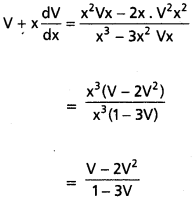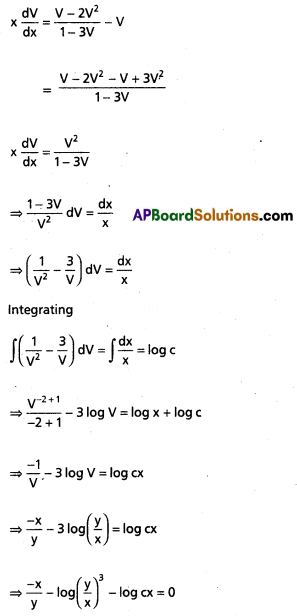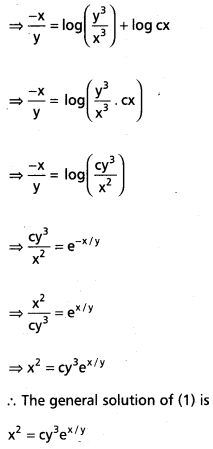Access to a variety of AP Inter 2nd Year Maths 2B Model Papers and AP Inter 2nd Year Maths 2B Question Paper March 2018 allows students to familiarize themselves with different question patterns.
AP Inter 2nd Year Maths 2B Question Paper March 2018
Time : 3 Hours
Max. Marks : 75
Note : This question paper consists of three sections A, B and C.
Section – A (10 × 2 = 20)
I. Very Short Answer Type Questions.
- Attempt all questions.
- Each question carries two marks.
Question 1.
Obtain the parametric equation of circle (x – 3)2 + (y – 4)2 = 82.
Solution:
Given circle equation is (x – 3)2 + (y – 4)2 = 82
Here h = 3, k = 4 and r = 8
Parametric equations are x = h + r cos θ
= 3 + 8 cos θ
y = k + r sin θ
= 4 + 8 sin θ where 0 ≤ θ < 2θ
Question 2.
Find the equation of the normal at P(3, 5) of the circle S = x2 + y2 – 10x – 2y + 6.
Solution:
Given S ≡ x2 + y2 – 10x – 2y + 6
Here 2g = -10 ⇒ g = -5
2f = -2 ⇒ f = -1
The equation of the normal of p(3, 5) or the circle S = 0 is
(x – x1) (y1 + f) – (y – y1) (x1 + g) = 0
⇒ (x – 3) (5 – 1) – (y – 5) (3 – 5) = 0
⇒ (x – 3)4 – (y – 5) (-2) = 0
⇒ 4x – 12 + 2y – 10 = 0
⇒ 4x + 2y – 22 = 0
⇒ 2x + y – 11 = 0
![]()
Question 3.
If x2 + y2 – 5x – 14y – 34 = 0, x2 + y2 + 2x + 4y + k = 0 circles are orthogonal, then find ‘k’.
Solution:
Given circle equations are
x2 + y2 – 5x – 14y – 34 = 0 …… (1)
x2 + y2 + 2x + 4y + k = 0 ……. (2)
Here 2g = -5 ⇒ g = \(\frac{-5}{2}\)
2f = -14 ⇒ f = -7 and c = -34
2g’ = 2 ⇒ g‘ = 1
2f’ = 4 ⇒ f = 2 and c’ = k
Since (1), (2) are orthogonal
∴ 2gg’ + 2ff’ + c + c’
⇒ 2\(\left(\frac{-5}{2}\right)\)(1) + 2(-7) (2) = -34 + k
⇒ -5 – 28 = -34 + k
⇒ k = -33 + 34
⇒ k = 1
Question 4.
Find the value of k if the line 2y = 5x + k is a tangent to the parabola y2 = 6x.
Solution:
Given line eq. is 2y = 5x + k
⇒ y = \(\left(\frac{-5}{2}\right)\)x + \(\frac{k}{2}\) …….. (1)
Here m = \(\frac{5}{2}\) and c = \(\frac{k}{2}\)
Given parabola equation is y2 = 6x
Here 4a = 6 ⇒ a = \(\frac{6}{4}\)
⇒ a = \(\frac{3}{2}\)
Since (1) is tangent to the parabola y2 = 6x
∴ c = \(\frac{a}{m}\)
⇒ \(\frac{k}{2}\) = \(\frac{\frac{3}{2}}{\frac{5}{2}}\)
⇒ \(\frac{k}{2}\) = \(\frac{3}{5}\)
⇒ k = \(\frac{6}{5}\)
Question 5.
Find the eccentricity and length of the latus rectum of the hyperbola 16y2 – 9x2 = 144.
Solution:
Given hyperbola equation is 16y2 – 9x2 = 144
⇒ \(\frac{y^2}{9}\) – \(\frac{x^2}{16}\) = 1
Here a2 = 16, b2 = 9
Eccentricity = \(\sqrt{\frac{a^2+b^2}{b^2}}\) = \(\sqrt{\frac{16+9}{9}}\) = \(\frac{5}{3}\)
Length or the latus rectum = \(\frac{2 a^2}{b}\) = \(\frac{2.16}{3}\) = \(\frac{32}{3}\)
Question 6.
Evaluate : \(\int \frac{\sin \left(\tan ^{-1} x\right)}{1+x^2}\)dx, x ∈ R .
Solution:
I = \(\int \frac{\sin \left(\tan ^{-1} x\right)}{1+x^2} d x\)
Put tan-1x = t
Then \(\frac{1}{1+x^2}\)dx = dt
= ∫sin t dt
= -cos t + c
= -cos(tan-1x) + c
∴ \(\int \frac{\sin \left(\tan ^{-1} x\right)}{1+x^2} d x\) = -cos(tan-1x) + c
Question 7.
Evaluate \(\int e^x\left[\frac{1+x \log x}{x}\right] d x\) on (0, ∞)
Solution:
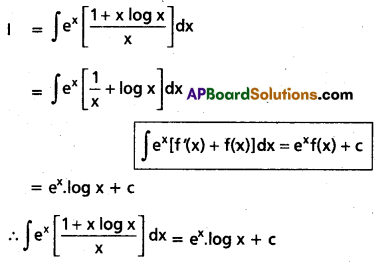
Question 8.
Evaluate : \(\int_0^\pi \sqrt{2+2 \cos \theta d \theta}\)
Solution:
\(\int_0^\pi \sqrt{2+2 \cos \theta} d \theta\) = \(\int_0^\pi \sqrt{2(1+2 \cos \theta)} d \theta\)
= \(\int_0^\pi \sqrt{2.2 \cos ^2 \frac{\theta}{2}} d \theta\)
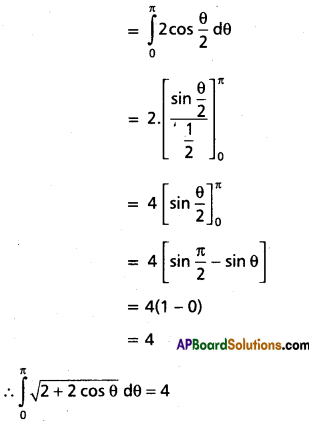
Question 9.
Find : \(\int_{-\frac{\pi}{2}}^{\frac{\pi}{2}} \sin ^2 x \cos ^4 x d x\).
Solution:
I = \(\int_{\frac{-\pi}{2}}^{\frac{\pi}{2}}\)sin2xcos4x dx
since sin2xcos4x is an even function
= 2\(\int_0^{\frac{\pi}{2}}\)sin2xcos4x dx
= 2.\(\frac{2-1}{2+4}\).\(\frac{4-1}{4}\).\(\frac{1}{2}\).\(\frac{\pi}{2}\)
= 2.\(\frac{1}{6}\).\(\frac{3}{4}\).\(\frac{1}{2}\).\(\frac{\pi}{2}\)
= \(\frac{\pi}{16}\)
∴ \(\int_{\frac{-\pi}{2}}^{\frac{\pi}{2}}\)sin2xcos4x = \(\frac{\pi}{16}\)
![]()
Question 10.
Find the order and degree of : x1/2\(\left[\frac{d^2 y}{d x^2}\right]^{1 / 3}\) + x\(\frac{d y}{d x}\) + y = 0.
Solution:
Given differential equation is
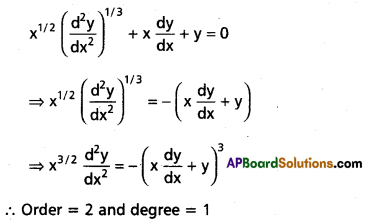
Section – B
II. Short Answer Type Questions.
- Attempt any five questions.
- Each question carries four marks.
Question 11.
Find the length of the chord intercepted by the circle x2 + y2 – x + 3y – 22 = 0 on the line y = x – 3.
Solution:
Given circle equation is x2 + y2 – x + 3y – 22 = 0
Centre C = (\(\frac{1}{2}\), \(\frac{-3}{2}\))
Radius r = \(\sqrt{\frac{1}{4}+\frac{9}{4}-(-22)}\)
= \(\sqrt{\frac{1+9+88}{4}}\)
= \(\sqrt{\frac{98}{4}}\)
d = The ⊥las distance from c to the line x – y – 3 = 0
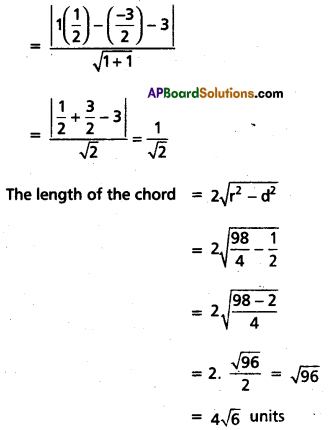
Question 12.
Find the radical centre of the three circles :
i) x2 + y2 – 4x – 6y + 5 = 0
ii) x2 + y2 – 2x – 4y – 1 = 0
iii) x2 + y2 – 6x- 2y = 0
Solution:
Let S ≡ x2 + y2 – 4x – 6y + 5 = 0
S’ ≡ x2 + y2 – 2x – 4y – 1 = 0
S” ≡ x2 + y2 – 6x – 2y = 0
The radical axis of S = 0, S’ = 0 is S – S’ = 0
⇒ x2 + y2 – 4x – 6y + 5 – x2 – y2 + 2x + 4y + 1 = 0
⇒ -2x – 2y + 6 = 0
⇒ 2x + 2y – 6 = 0
⇒ x + y – 3 = 0 ……… (1)
The radical axis of S = 0, S” = 0 is S – S” = 0
⇒ x2 + y2 – 4x – 6y + 5 – x2 – y2 + 6x + 2y = 0
⇒ 2x – 4y + 5 = 0 …….. (2)
Solving (1) and (2)
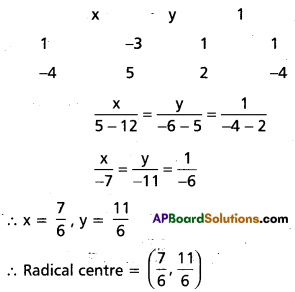
Question 13.
Find the equation of the ellipse in the standard form whose distance between foci is 2 and the length of latus rectum is \(\frac{15}{2}\).
Solution:
Given distance between foci is 2
⇒ 2ae = 2
⇒ ae = 1 ……. (1)
Also length of the latus rectum = \(\frac{15}{2}\)
⇒ \(\frac{2 b^2}{a}\) = \(\frac{15}{2}\)
⇒ \(\frac{-a^2\left(e^2-1\right)}{a^1}\) = \(\frac{15}{4}\)
⇒ \(\frac{-a^2 e^2+a^2}{a}\) = \(\frac{15}{4}\)
⇒ \(\frac{-1+a^2}{a}\) = \(\frac{15}{4}\)
⇒ – 4 + 4a2 = 15a
⇒ 4a2 – 15a – 4 = 0
⇒ 4a2 – 16a + a – 4 = 0
⇒ 4a (a – 4) + 1 (a – 4) = 0
⇒ (a – 4) (4a + 1) = 0
Since a > 0
∴ a = 4
from (1) e = \(\frac{1}{4}\)
b2 = a2 (1 – e2)
= 16(1 – \(\frac{1}{16}\))
= 16(\(\frac{15}{16}\))
= 15
Hence required ellipse equation is
\(\frac{x^2}{16}\) + \(\frac{y^2}{15}\) = 1
Question 14.
If a tangent to the ellipse \(\frac{x^2}{a^2}\) + \(\frac{y^2}{b^2}\) = 1 (a > b) meets its major axis and minor axis at M and N respectively, then prove that \(\frac{a^2}{(\mathrm{CM})^2}\) + \(\frac{b^2}{(C N)^2}\) = 1 where C is the centre of the ellipse.
Solution:
Given Ellipse equation is
\(\frac{x^2}{a^2}\) + \(\frac{y^2}{b^2}\) = 1(a > b)
Let P(a cos θ, b sin θ) be any point on the ellipse.
Equation of the tangent at p(θ) is
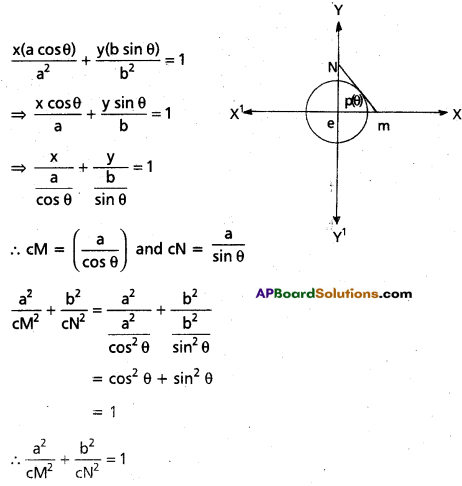
Question 15.
Find the centre, foci, eccentricity, equation of the directrices, length of the latus rectum of the hyperbola x2 – 4y2 = 4.
Solution:
Given hyperbola equation is x2 – 4y2 = 4
⇒ \(\frac{x^2}{4}\) – \(\frac{y^2}{1}\) = 1
Here a2 = 4, b2 = 1
Centre = (0, 0)
Eccentricity = \(\sqrt{\frac{a^2+b^2}{a^2}}\) = \(\sqrt{\frac{4+1}{4}}\) = \(\frac{\sqrt{5}}{2}\)
Foci = (± a e, 0) = (± 2.\(\frac{\sqrt{5}}{2}\), 0)
= (±\(\sqrt{5}\), 0)
Equations of divertrices are x = ± \(\frac{\mathrm{a}}{\mathrm{e}}\)
⇒ x = ±\(\frac{2}{\frac{\sqrt{5}}{2}}\)
⇒ x = ±\(\frac{4}{\sqrt{5}}\)
Length or the latus rectum = \(\frac{2 b^2}{a}\) = \(\frac{2.1}{2}\) = 1
![]()
Question 16.
Find the area bounded by the curves y = sin x and y = cos x between any two consecutive points of intersection.
Solution:
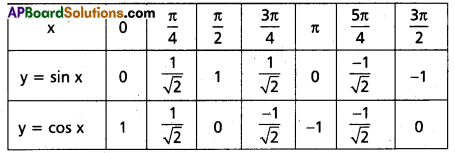
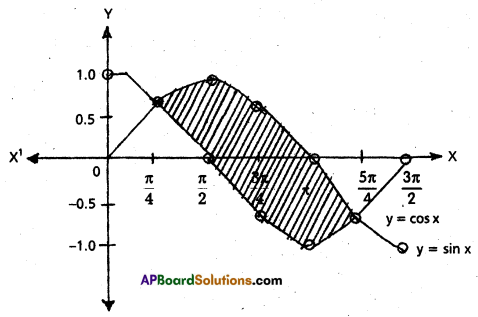
Two points or intersection of the curves y = sin x and y = cos x are \(\left(\frac{\pi}{4}, \frac{1}{\sqrt{2}}\right)\) and \(\left(\frac{5 \pi}{4}, \frac{-1}{\sqrt{2}}\right)\)
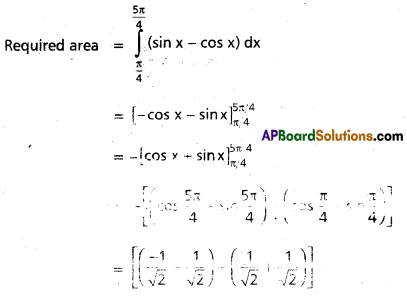
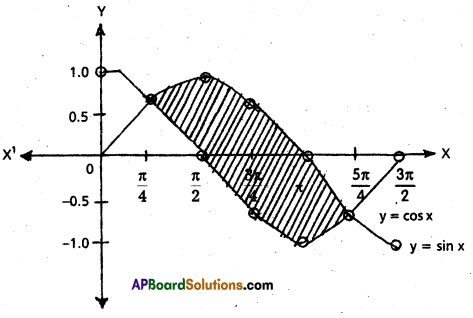
Two points or intersection of the curves y = sin x and y = cos x are \(\left(\frac{\pi}{4}, \frac{1}{\sqrt{2}}\right)\) and \(\left(\frac{5 \pi}{4}, \frac{-1}{\sqrt{2}}\right)\)
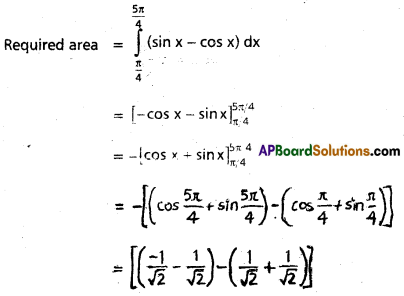
= –\(\left[\frac{-2}{\sqrt{2}}-\frac{2}{\sqrt{2}}\right]\)
= \(\sqrt{2}\) + \(\sqrt{2}\)
= 2\(\sqrt{2}\) sq. units.
Question 17.
Solve : (1 + x2)\(\frac{d y}{d x}\) + y = \(e^{\tan ^{-1} x}\).
Solution:
Given (1 + x2)\(\frac{d y}{d x}\) + y = tan-1 x
⇒ \(\frac{d y}{d x}\) + \(\frac{1}{1+x^2}\)y = \(\frac{\tan ^{-1} x}{1+x^2}\) ……. (1)
This is a linear differential equation of the first order in y
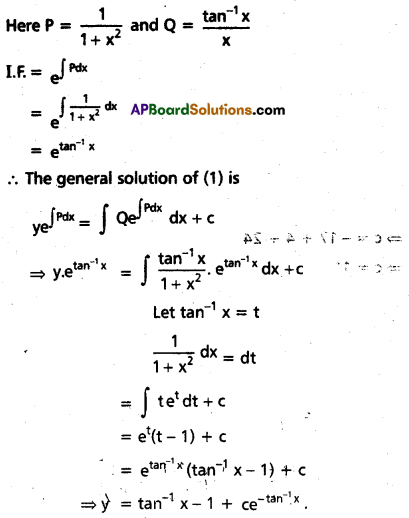
Section – C
III. Long Answer Type Questions.
- Attempt any five questions.
- Each question carries seven marks.
Question 18.
Find the equation of circle passing through the three points (3, 4), (3, 2), (1, 4).
Solution:
Let x2 + y2 + 2gx + 2fy + c = 0 ……. (1) be the required circle
If (1) passes through (3, 4) then
9 + 16 + 6g + 8f + c = 0
⇒ 6g + 8f + c = -25 …… (2)
If (1) passes through (3, 2) then
9 + 4 + 6g + 4f + c = 0
⇒ 6g + 4f + c = -13 ……… (3)
If (1) passes through (1, 4) then
1 + 16 + 2g + 8f + c = 0
⇒ 2g + 8f + c = -17 ……. (4)
(2) – (3) ⇒ 4f = – 12 ⇒ f = -3
(2) – (4) ⇒ 4g = – 8 ⇒ g = -2
From (4)
2(-2) + 8(-3) + c = – 17
⇒ c = -17 + 4 + 24
⇒ c = 11
Hence required circle equation is
x2 + y2 + 2(-2)x + 2(-3)y + 11 = 0
⇒ x2 + y2 – 4x – 6y + 11 = 0.
Question 19.
Find the direct common tangents of the circles x2 + y2 + 22x – 4y – 100 = 0 and x2 + y2 – 22x + 4y + 100 = 0.
Solution:
Given circle equations are
S ≡ x2 + y2 + 22x – 4y – 100 = 0
S’ ≡ x2 + y2 – 22x + 4y + 100 = 0
C1 = (-11, 2) r1 = \(\sqrt{121+4+100}\) = 15
C2 = (-11, 2) r2 = \(\sqrt{121+4-100}\) = 5
d = C1C2 = \(\sqrt{(11+11)^2+(-2-2)^2}\)
= \(\sqrt{484+16}\)
= \(\sqrt{500}\) = 10\(\sqrt{5}\)
d > r1 + r2
∴ The two circles do not intersect.
Let P be the external centre of similitude.
∴ P divides C1C2 in ratio r1 : r2 = 15 : 5 = 3 : 1 externally.
P = \(\left(\frac{3(11)-1(-11)}{3-1}, \frac{3(-2)-1(2)}{3-1}\right)\)
= \(\left(\frac{33+11}{2}, \frac{-6-2}{2}\right)\) = (22, -4)
∴ Equation of pair of direct common tangents to the circle
S = 0 is \(S_1^2\) = SS11
⇒ [x(22) + y(- 4) + 11 (x + 22) – 2(y – 4) – 100]2
= (x2 + y2 + 22x – 4y – 100) (484 + 16 + 484 + 16 – 100)
⇒ [22x – 4y + 11x + 242 – 2y + 8 – 100]2 = (x2 + y2 + 22x – 4y – 100)(900)
⇒ [33x – 6y + 150]2 = (x2 + y2 + 22x – 4y – 100)(900)
⇒ [11x – 2y + 50]2 = (x2 + y2 + 22x – 4y – 100)(100)
⇒ 121x2 + 4y2 + 2500 – 44xy -200y + 1100x = 100x2 + 100y2 + 2200x – 400y – 10000
⇒ 21x2 – 96y2 – 44xy – 1100x + 200y + 12500 = 0
21x2 – 44xy – 96y2 = 21x2 – 72xy + 28xy – 96y2
= 3x(7x – 24y) + 4y(7x – 24y)
= (3x + 4y)(7x – 24y)
21x2 – 44xy – 96y2 – 1100x + 200y + 12500 = (3λ + 4y + l) (7x – 24y + m)
7l + 3m = – 1100
-24l + 4m = 200
Solving l = – 50, m = – 250
∴ Required direct common tangents are
3x + 4y – 50 = 0
7x – 24y – 250 = 0
Question 20.
Prove that the area of the triangle formed, by the tangents at (x1, y1), (x2, y2) and (x3, y3) to the parabola y2 = 4ax (a > 0) is \(\frac{1}{16 a}\)|(y1 – yy2) (y2 – y3) (y3 – y1)| sq-units.
Solution:
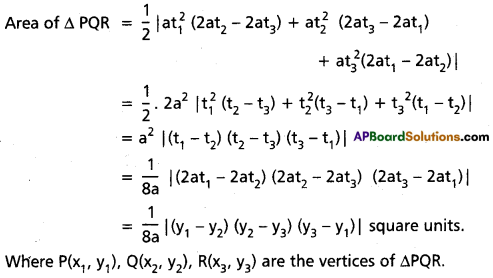
Question 21.
Evaluate : \(\int \frac{2 \cos x+3 \sin x}{4 \cos x+5 \sin x} d x\).
Solution:
Let 2 cos x + 3 sin x = A\(\frac{d}{d x}\) (4 cosx + 5 sin x) + B(4 cosx + 5 sinx)
= A(-4 sin x + 5 cos x) + B(4 cosx + 5 sinx)
now equating like terms on both sides, we have
2 = 5A + 4B ⇒ 5A + 4B – 2 = 0 …….. (1)
3 = -4A + 5B ⇒ 4A + 5B + 3 = 0 …….. (2)
Solving (1) and (2) ”
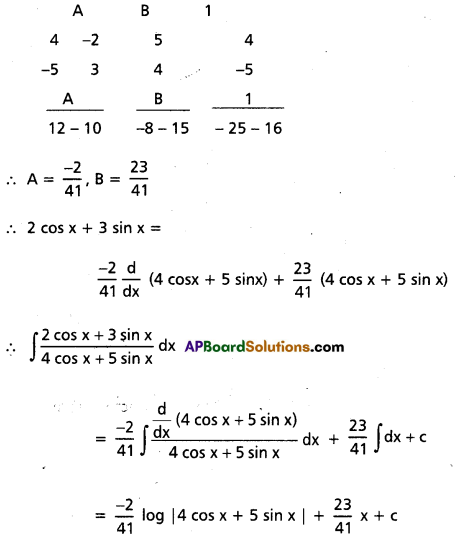
![]()
Question 22.
Obtain reduction formula for In – ∫tannx dx, n being a positive integer n ≥ 2 and deduce the value of ∫tan6 x dx.
Solution:
Let In = ∫Tannx dx
= ∫Tann-2x Tan2x dx
= ∫Tann-2x(sec2x – 1)dx
= ∫Tann-2xsec2x dx – ∫Tann-2xdx
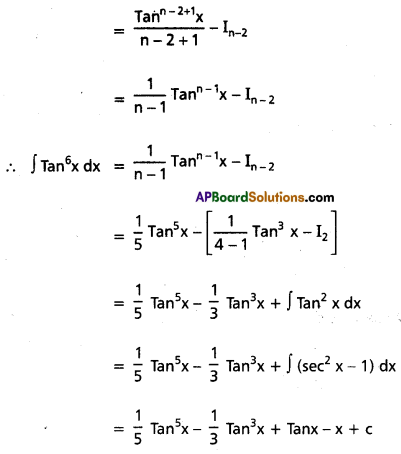
Question 23.
Show that: \(\int_0^{\frac{\pi}{2}} \frac{x}{\sin x+\cos x}\) dx = \(\frac{\pi}{2 \sqrt{2}}\)log (\(\sqrt{2}\) + 1)
Solution:
I = \(\int_0^{\pi / 2} \frac{x}{\sin x+\cos x} d x\) …. (1)
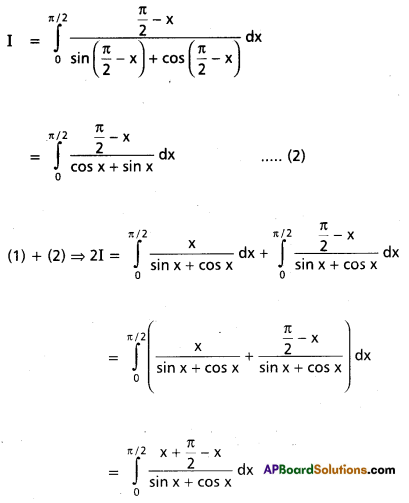
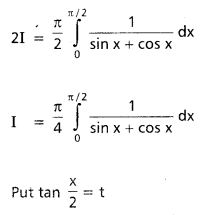
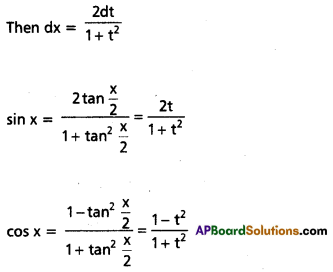
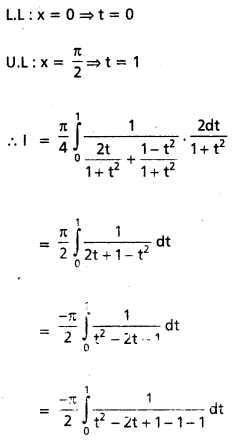
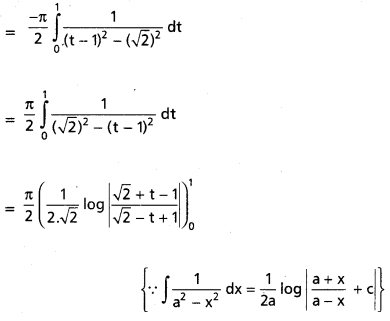
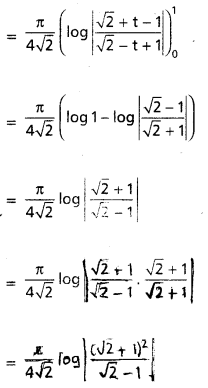
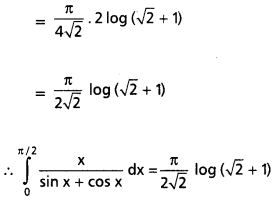
Question 24.
Solve : (x2y – 2xy2)dx = (x3 – 3x2y)dy.
Solution:
Solution:
Given differential equation is
(x2y – 2xy2)dx = (x3 – 3x2y)dy
⇒ \(\frac{d y}{d x}\) = \(\frac{x^2 y-2 x y^2}{x^3-3 x^2 y}\) …….. (1)
Put y = Vx
\(\frac{\mathrm{dy}}{\mathrm{dx}}\) = V + x\(\frac{d V}{d x}\)
Substituting these values in (1), we get
